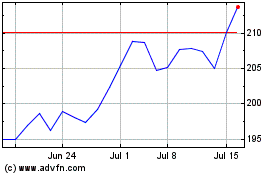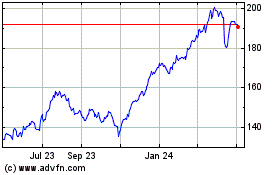By Emily Glazer and Peter Rudegeair
Volatile markets often boost trading results, but they didn't
help J.P. Morgan Chase & Co. in the third quarter.
The nation's largest lender by assets said trading revenue
declined 15% during the quarter, though a supersize tax benefit
helped the bank report a 22% increase in third-quarter profit.
J.P. Morgan reported profit of $6.8 billion, or $1.68 a share.
That compared with a profit of $5.57 billion in the same period of
2014. Excluding $2.2 billion of tax benefits and other items,
however, earnings came in at $1.32 a share, a nickel shy of the
$1.37 a share expected by analysts polled by Thomson Reuters.
It's "tough to jump up and down about the results given the
market beatdown," noted Evercore ISI analyst Glenn Schorr. Shares
dropped 1.9% to $60.36 after hours, but Mr. Schorr noted that most
of the difficulty in the quarter had been expected in recent
weeks.
Revenue at the New York bank fell 6.9% to $22.78 billion during
the quarter.
Trading revenue decreased 15% to $4.34 billion from $5.07
billion in the third quarter of 2014. Chief Executive James Dimon
said at an investor conference in September that trading results
would be "similar" to other banks, following comments from Bank of
America Corp. and Citigroup Inc. executives that revenue at their
units trading equities, bonds, currencies and commodities were
expected to fall about 5% in the third quarter.
Revenue from trading bonds, currencies and commodities fell 23%
to $2.93 billion, while revenue from a smaller division that trades
stocks rose 9% to $1.4 billion. The bank said that weakness in
trading commodities and credit products such as corporate bonds was
partially offset by strength in trading currencies, emerging-market
debt and equity derivatives.
Adjusting for revenue declines from prior decisions to exit
businesses in commodities and elsewhere, the bond-trading unit's
revenue fell 11%.
"We did well where there was volatility," said J.P. Morgan Chief
Financial Officer Marianne Lake on a call after results were
released. "Where there wasn't, [it was] more about low levels of
activity, people on the sidelines. It's tougher to make money
because less is happening." She noted that markets were still
"reasonably quiet" so far in October.
In investment banking, the bank reported a 4.5% year-over-year
rise in revenue to $1.61 billion for the quarter and a 35% drop in
equity-underwriting fees.
Debt-underwriting fees, however, rose 17% from last year's third
quarter, and merger-and-acquisition advisory fees rose 22% year
over year.
The bank attributed its significant tax benefits to the
"resolution of tax audits and the release of deferred taxes"
related to the financial crisis. Its effective income-tax rate for
the third quarter was -1.1%, compared with 29.7% a year ago.
J.P. Morgan extended $29.9 billion in mortgages in the quarter,
an increase of 41% from the $21.2 billion in the third quarter a
year ago. Profit in its mortgage division, one of the largest in
the U.S. by volume, was $602 million, up 29% from the $465 million
it reported for the third quarter of 2014.
Costs decreased 2.7% to $15.37 billion from $15.8 billion a year
earlier. Banks have been under continued pressure to keep costs in
check as interest rates have remained low, which limits the profit
margins in lending businesses.
The bank's legal tab totaled $1.3 billion, higher than the $1.06
billion it reported a year earlier and the $291 million it recorded
in the second quarter. The Wall Street Journal reported over the
summer that J.P. Morgan is expected to settle in coming weeks with
the Securities and Exchange Commission and Commodity Futures
Trading Commission for more than $150 million regarding whether the
bank steered some clients into its own investment products without
proper disclosure.
Overall profit at the corporate and investment bank was $1.46
billion, a 13% decrease from $1.68 billion a year earlier. In the
consumer bank, profit was $2.63 billion, compared with $2.53
billion a year earlier.
J.P. Morgan's commercial bank earned $518 million, a 23%
decrease from $671 million a year earlier, and the asset-management
unit reported profit of $475 million, compared with $590 million a
year earlier.
J.P. Morgan lost $963 million to loan defaults, or 0.51% of its
overall portfolio, compared with a 0.65% charge-off rate in the
third quarter.
Return on equity, a measure of profitability, rose to 12% from
10% a year earlier. J.P. Morgan faced some questions from analysts
and investors earlier this year over whether it might be better for
shareholders if the global bank broke itself up into smaller, more
manageable units.
The bank continued to cut its workforce last quarter, shedding
1,781 people to 235,678.
On the call with journalists, Ms. Lake noted that loans grew
across the bank's balance sheet. She noted that credit-card loans
haven't seen growth in many quarters, and even there, the
credit-card core loan growth picked up 3%.
J.P. Morgan kicks off the third-quarter earnings season for
large U.S. banks. Shares in J.P. Morgan hit an record of $70.61 in
July but have fallen 13% since then as investors came to terms with
a slowing trading environment and continued low interest rates.
Write to Emily Glazer at emily.glazer@wsj.com
Subscribe to WSJ: http://online.wsj.com?mod=djnwires
(END) Dow Jones Newswires
October 13, 2015 19:14 ET (23:14 GMT)
Copyright (c) 2015 Dow Jones & Company, Inc.
JP Morgan Chase (NYSE:JPM)
Historical Stock Chart
From Mar 2024 to Apr 2024

JP Morgan Chase (NYSE:JPM)
Historical Stock Chart
From Apr 2023 to Apr 2024
